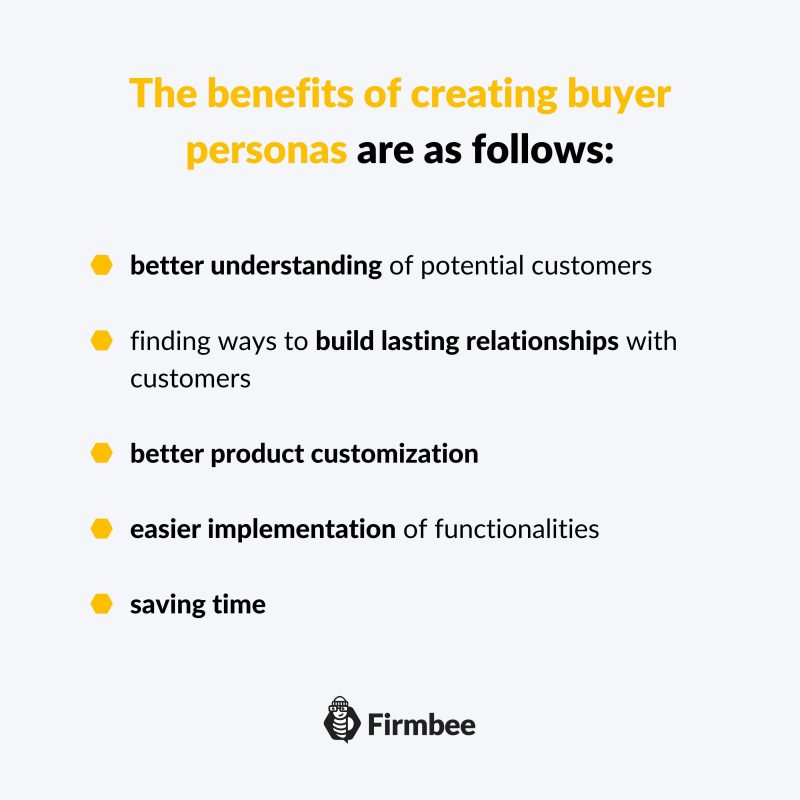Your startup will only succeed if it delivers a product that truly solves a customer’s problem. However, how do you know who the customer is? You need to find your target audience, and the best way to do it is to create a buyer persona. What is a buyer persona and how to create it? Read our article and find out.
What is a buyer persona? – table of contents:
- What is a buyer persona?
- How to create a buyer persona?
- Who should create a buyer persona?
- What tools do you need to create a buyer persona?
- Benefits of creating a buyer persona
- Summary
What is a buyer persona?
For starters, it is important to clarify what a buyer persona is. Before your business pulls off, it is necessary to define the target audience that the product will be aimed at. It is difficult to build an effective marketing strategy without it.
A buyer persona, also often referred to as a marketing or customer persona, represents your ideal customer as it is an extensive description of those who would fit into your customer base. Creating a marketing persona will let you understand your customers’ pain points and provide solutions through your products or services.
A marketing persona reflects your potential customer and it may play a few roles in the buying process. There are 5 buying roles to look out for in the sales process:
- initiators who pitch the idea of buying a product,
- influencers whose opinions can influence other people’s purchasing decisions,
- deciders who decide on any component of a buying decision, e.g., whether to buy, what to buy, how to buy,
- buyers who actually buy a product,
- users who use the product.
How to create a buyer persona?
How to create a marketing persona? You need to take into account several customers’ characteristics, and their selection depends on the given industry, the specific product, and the business venture. Demographic and professional data are essential, but you can’t stop there if you want to know your model customer’s motivations.
When creating customer personas consider the following aspects:
- demography (age, gender, a place of residence, education)
- work (industry, company, position, technological knowledge)
- daily life (family, leisure activities, media)
- values (attitude towards various important issues, e.g., ecology)

You should also answer such questions as:
- Why may the product be appealing to the customer?
- What will the customer achieve by using the product?
- What can attract more interest in the product?
- What might discourage the customer from buying the product?
Who should be involved in creating a buyer persona?
The more insight you get into who your ideal customer is, the more likely you’ll craft an accurate description of this person. Therefore, marketing personas should be created by everyone who interacts with your customers. These people have direct knowledge of their specific problems and motivations. Also, include your customers themselves. You’d be amazed how much information you can get from them if they are interested.
What tools do you need to create a buyer persona?
It is worth using various tools that facilitate the creation of a customer profile, e.g., ready-made templates and Google Analytics. Other popular platforms for creating personas include Xtensio, Personapp.io, Smaply and Uxpressia.

Benefits of creating a buyer persona
The benefits of creating marketing personas are as follows:
- better understanding of potential customers
- finding ways to build lasting relationships with customers
- better product customization
- easier implementation of functionalities
- saving time
Summary
Creating marketing personas is just one of the initial stages of building a relationship with customers, identifying their needs and providing them with solutions. Thanks to a marketing persona, you can map the customer journey, define your clients’ problems and develop new ideas. It is worthwhile to verify your customer personas in practice and constantly improve them in the process.
Other resources: Top 6 most profitable small businesses.
If you like our content, join our busy bees community on Facebook, Twitter, LinkedIn, Instagram, YouTube, Pinterest.
Author: Andy Nichols
A problem solver with 5 different degrees and endless reserves of motivation. This makes him a perfect Business Owner & Manager. When searching for employees and partners, openness and curiosity of the world are qualities he values the most.
Launch your startup:
- What is a startup?
- Pros and cons of creating a startup
- 8 best industries for startups
- Top 5 skills every highly successful startup founder needs
- How to create a startup? 7 simple and easy steps
- 6 essential startup development stages
- How to create a startup growth strategy?
- General startup statistics you need to know
- Startup vs. corporate job. Which is right for you?
- 5 incredible companies that started in a garage
- How to find a business idea?
- How to check if your startup idea already exists?
- How to name a startup? Useful tips and strategies
- How to gain business knowledge quickly? 5 best practices
- Why do startups fail? 6 startup ideas you should avoid
- 5 weird business ideas that made millions
- Top 6 most profitable small businesses
- 7 questions to determine if your business idea is worth pursuing
- What is a buyer persona? 5 benefits of creating a buyer persona
- How to validate your business idea? 3 easy steps
- Should you follow your passion? The importance of passion in business
- What is market reseach and why is it important?
- Using social media in business
- What to do when you have too many business ideas?
- How to write a good problem statement for your startup?
- How to test your business idea for real?
- How to create a prototype for a product?
- How to build an MVP?
- How to use surveys for testing your business idea?
- 10 useful tools to validate your business idea
- What is a business plan? 4 types of business plans
- What should be included in a business plan?
- What should a product description include?
- Competitor analysis
- Marketing strategy
- Traditional business plan vs. lean startup plan
- Implementation plan. What is it and how to create it?
- Everything you need to know about patents
- Financial management for startups
- What permits and licenses does my startup need?
- What is the average startup founder salary?
- 4 startup taxes you need to pay
- Which legal structure is best for your business?
- Startup costs. How much money will you need?
- Protection of intellectual property in a startup
- Family funding vs. self-funding
- What is a shareholders’ agreement?
- What should a financial section of a business plan include?


















